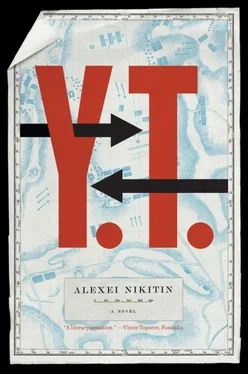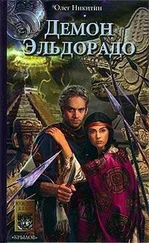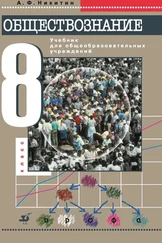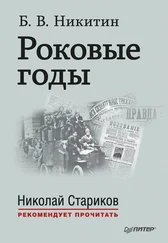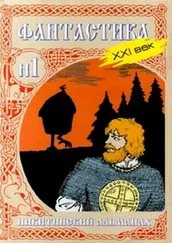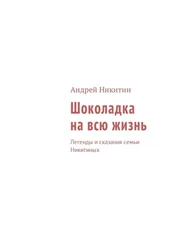The Simirenkovs also worked in three brigades: ‘Lev Simirenko’ (the vigilant instructors from the regional committee forbade ‘Levok Platonovych’), ‘Platon Simirenko’ (publisher of the 1860 edition of Taras Shevchenko’s The Bard ) and ‘Vladimir Simirenko the Repressed’ (the son of Levok Platonovych, first director of the Institute of Pomology). They were ready to find a fourth Simirenko and a fifth for our brigade, but we were planning to make do with the humble name of Reinette. The Simirenkovs were aggrieved by our lack of discrimination—it scarcely mattered to us which of their precious Reinettes we chose. In order to please them without losing face, we compromised and called ourselves ‘Reinette—S.’ The S was a capital letter, never ever to be written lower-case s, so that, God willing, it wouldn’t be confused with the sery variety… Kurochkin headed up the brigade, and its general management fell to Associate Professor Nedremailo.
At long last assigned to brigades, the brigades given names and schedules drawn up for kitchen duties and visits to the bath house, we were launched into battle against the harvest of this rose-family fruit tree… or that is what ought to have happened, but they were in no hurry to let us loose on the apples. Now it was time for theory. After all, how can you pick apples without knowing how to lay a garden, graft and regraft, properly keep cuttings in winter and shape the crown of a fruit tree? Drawings of seedlings crowded the blackboard along with examples of the right and wrong way to plant and how to prepare the garden for winter. Quotations from Columella on yellowing cardboard signs were stuck to the classroom walls.
The time passed. They fed us, let us bathe once a week and showed us a film every other day. But they wouldn’t let us at the apples. The rains passed, and it was the middle of September, a warm and golden time of year. I regarded the treetops and rooftops of Greater Apple with longing, unable to comprehend what the problem was.
Not that I was itching to get into the orchard and fill wooden crates with apples. But there ought to be a reason for everything. Here I couldn’t see it.
As it turned out, there was a reason. In Greater Apple Antonovkas were harvested in late August and Simirenkos in early October. They needed students in August and in October. Two applications went out to the district. The district replied that they would send students only once, either in August or October. Take your pick. But it was impossible for Greater Apple to pick one or the other—the interests of the Antonovs were blocked mercilessly by the Simirenkovs, and any proposal made by the Simirenkovs was taken by the Antonovs as a personal slight. Yet Greater Apple couldn’t refuse the students. If they refused them once, next time they wouldn’t be offered at all. Which is how we ended up there in September. So as not to upset the Antonovs nor wound the Simirenkovs. But in September there was no work for us in the orchard.
When I heard this story in all its marvelous simplicity I grasped why the village didn’t have a small canning facility of its own, and why—at the loss of time, money, and face—the apples were still being shipped to Zhytomyr the same way as forty years before.
It doesn’t matter where I learned this, and I can’t remember anyway. On the other hand, I distinctly remember how one day in class, languishing from boredom and inactivity, Kurochkin sent Korostishevski a message via pneumatic tube.
Dearest Prince Korostishevski of Zhytomyr and Volodar-Volyn, Magistrate of People’s Pomology
It has come to our attention that even now the Principality of Korostishev has not mastered the daubing of branches with garden pitch or oil-based paint after pruning. It has also come to our attention that even now you have not yet been trained in the summer topping of trees. We, Princes Kurozhski, Belozhski and Krasnozhski, are prepared, at absolutely no cost to you, to distribute our new technologies throughout your backward principality. In so far as you clean your guns with bricks to this day, we shall entrust the training of your gardeners to a battalion of Kurozhski sharpshooters. For bricks, please contact our manufacturer, Kur & Co. Home Building Supplies.
Korostishevski read the note and vanished. A reply came in the evening. Not from Korostishevski but Kanyuka.
The Order of Teutonic Orchard Lovers wishes to know more about the new garden-trimming techniques in widespread use in the Kurozh Principality. The Order’s delegation of 900 knights and 5,000 armored infantry are packing their suitcases. We propose a rendezvous and exchange of knowledge and experience on the banks of the Antonovka River. Please accept the chivalrous respects of the Grand Master of the Order KNK.
PS—Prince Korostishevski sends a brotherly kick up the ass and is detailing 800 horsemen and seven siege towers to the conference.
‘You’re an aggressor,’ I said to Kurochkin once I had read Kanyuka’s letter. ‘So how are you going to reply?’
‘What’s to stop me saying I’ll meet them with tactical nuclear weapons?’
‘And how is the Kurozh Principality going to get hold of nuclear weapons?’
‘How are their knights going to get hold of suitcases?’
‘They’re having their little joke.’
‘Well, so am I.’
‘No,’ I said, ‘it’s not the same thing.’
Kurochkin shrugged. ‘Well, I like it.’
‘I’d better write them myself or you’ll spoil it all.’
And I wrote:
The Zaporozhian Brothers, along with their allies the Tartars, Bulgars, Magyars and Khazars—countless in their numbers for no one has ever counted them—propose to meet Princes Korostishevski and Kurozhski and the Grand Order of Teutonic Garden Lovers for a friendly discussion of the urgent issues of pedigreed gardening. Potatoes, herring and tea to be furnished by your Zaporozhian hosts. Do not bother showing your face without horilka and mead.
At your service
Khan of the Zaporozhian Encampment, Davidov
That evening we drew up the Greater Apple Accord and divvied up everything that could be divvied up. Korostishevski claimed Western Europe; Kanyuka took Asia; Kurochkin, Russia; and I fancied the rather barbarous title Khan of the Encampment of Zaporozhye. Then we concluded several further agreements. We applied a common algorithm to determine army size, population growth and technological development. Later on I discovered that the game of Civilization is very similar. But how could we have been playing Civilization in Greater Apple in 1983? We were just playing a game. There was nothing else to do. You can’t just drink vodka all the time. It gets boring.
There were four of us, which made voting awkward. We kept coming to an impasse, two against two. We called in Reingarten for a fifth. Not so much for the game as for an uneven vote. Mishka took Mongolia, named Abakan his capital, dubbed himself Lama Undur Gegen and issued a decree that all of Mongolia should plunge itself into a state of nirvana.
‘Tell me, Alex,’ he would begin, gripping my wrist in a show of urgency, ‘how did you ever come up with such a strange game in the first place? Where did it all come from? Where did you find all these emperors, khans, caliphates? You’re Soviet students. You’re at university in the capital. Who gave you the idea? Go ahead and tell me everything you know. Don’t be afraid. You know you can be straight with me. We’re not going to hurt you.’
What did he want me to say? ‘Where did we get the idea? Someone planted it, Citizen Boss. Your secret agent and informer of many years’ standing, Associate Professor Nedremailo.’ Was that it? And what about the rest of them?
‘Do you remember The Black Book and Shwambraniya ? That’s where we got the idea. Lev Kassil…’
Читать дальше
